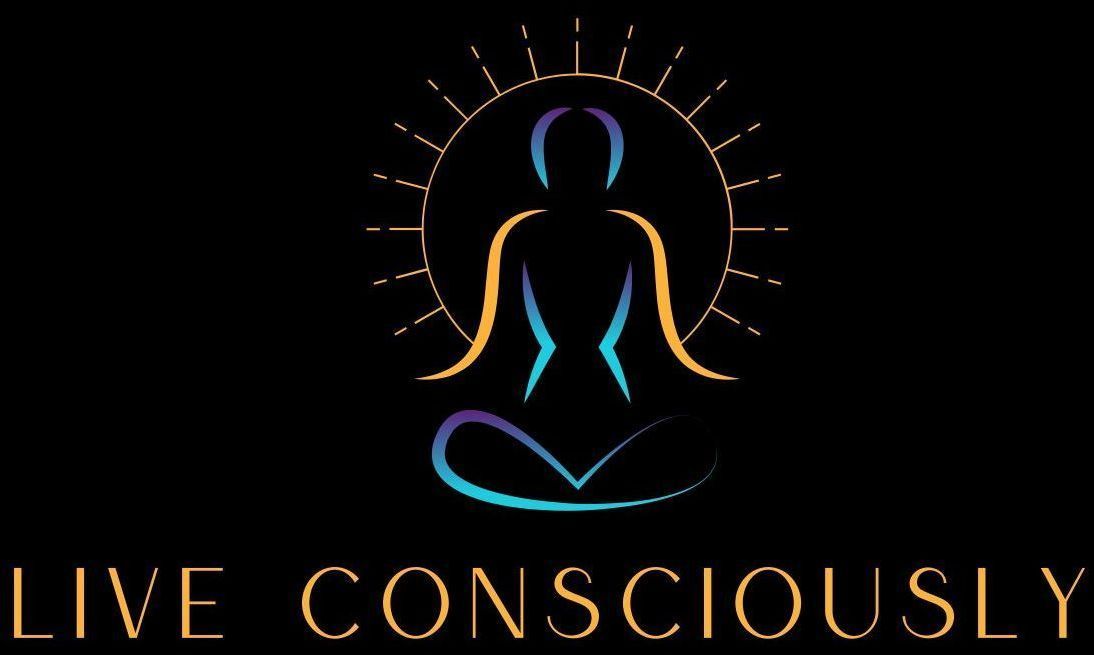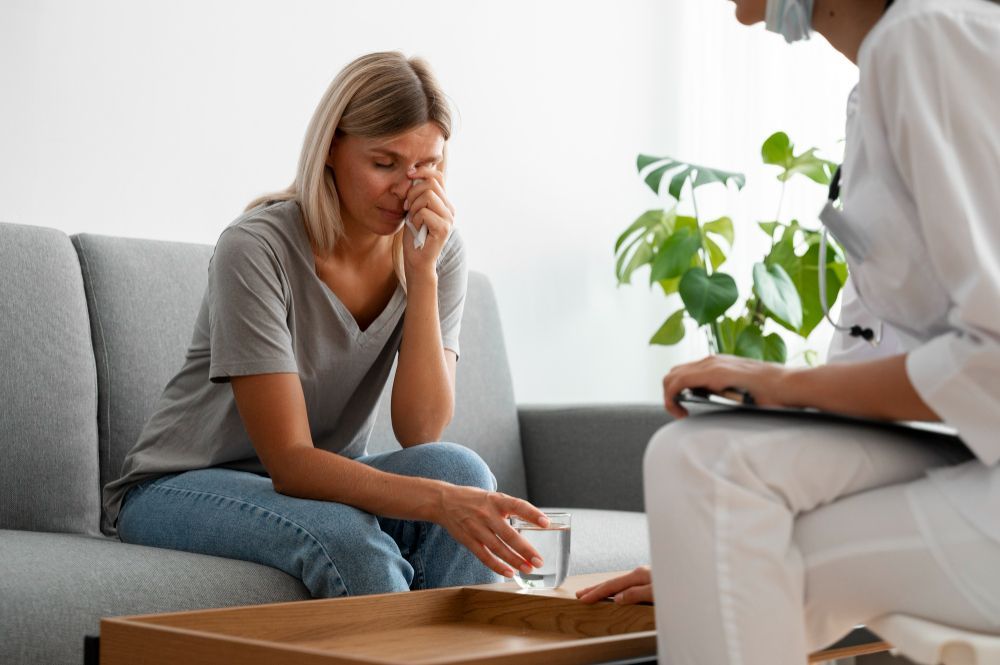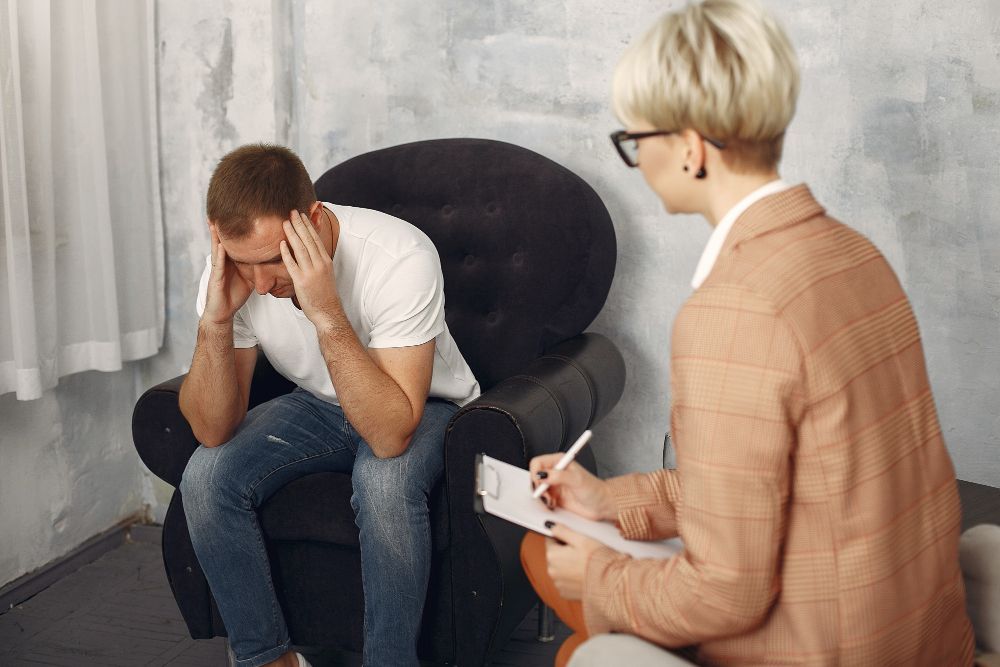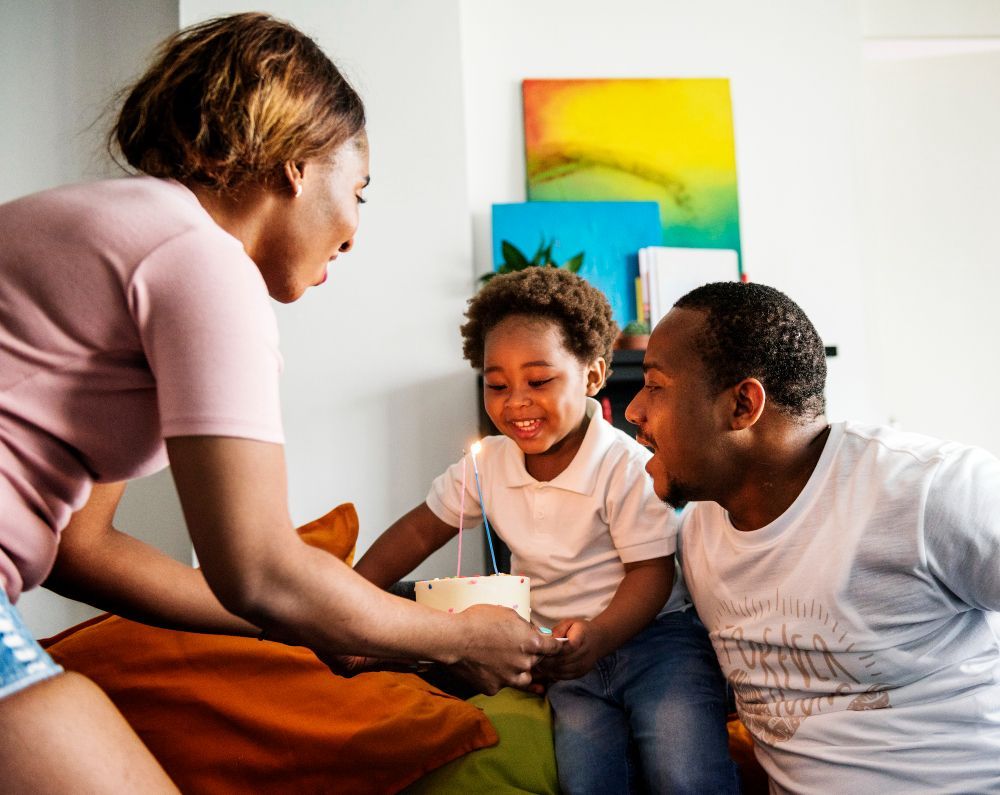Rebuilding Self-Trust After Trauma

Do you find yourself doubting every decision you make? Maybe you ask others what to do instead of trusting your own feelings. Or perhaps you feel like you can't rely on yourself when things get tough.
After trauma, it's normal to lose trust in yourself. Your inner voice might feel broken or missing. But here's what we want you to know: you can rebuild that trust.
At Live Consciously, we've walked with hundreds of trauma survivors as they rediscover their inner wisdom and strength. This journey from just surviving to actually growing and thriving is possible for you too.
In this guide, you'll learn:
- Why trauma damages self-trust
- Signs that you've lost connection with yourself
- Step-by-step ways to rebuild self-trust
- How to move from surviving to thriving
This information is educational and not a substitute for professional therapy. If you're struggling with trauma or having thoughts of self-harm, please reach out to a qualified mental health professional.

What Is Self-Trust?
Self-trust is believing in your own wisdom, feelings, and ability to make good choices. It's that inner voice that says "I've got this" when life gets hard.
When you have self-trust, you:
- Know what you need and ask for it
- Feel confident making decisions
- Trust your gut feelings about people and situations
- Believe you can handle whatever comes your way
- Feel worthy of love and good things
Think of self-trust like an internal compass. It points you toward what's right for you, even when the path isn't clear.
What Self-Trust Is NOT
Self-trust doesn't mean:
- You never make mistakes
- You don't need other people
- You always know what to do
- You never feel scared or unsure
- You have to do everything alone
Self-trust means you believe in your ability to learn, grow, and figure things out – even when it's hard.

How Trauma Breaks Self-Trust
Trauma teaches your brain that the world isn't safe. But sometimes, it also teaches you that you aren't safe to trust.
Ways Trauma Damages Self-Trust
Gaslighting: When someone tells you your feelings aren't real or your memories are wrong, you start doubting yourself.
Example: "You're too sensitive" or "That didn't happen the way you remember."
Betrayal by Trusted People: When someone who was supposed to protect you instead hurt you, it becomes hard to trust anyone – including yourself.
Being Overwhelmed: When trauma was too big to handle, your brain might have decided you can't handle difficult things.
Survival Mode: During trauma, you might have had to ignore your own needs to stay safe. Over time, you forget how to listen to yourself.
Shame Messages: Trauma often comes with messages like "It's your fault" or "You should have known better," which makes you doubt your judgment.
The Inner Critic Takes Over
After trauma, many people develop a harsh inner voice that constantly criticizes and doubts. This inner critic might say things like:
- "You always make bad choices"
- "You can't trust your feelings"
- "Everyone else knows better than you"
- "You're not strong enough to handle this"
- "You should have seen this coming"
This voice feels like it's protecting you from making more "mistakes," but it actually keeps you stuck and small.
The Journey from Survival to Growth
Rebuilding self-trust is like learning to walk again after an injury. It takes time, patience, and gentle practice.
Phase 1: Survival Mode (Where You Might Be Now)
In survival mode, your focus is just getting through each day. You might:
- Feel constantly stressed or numb
- React instead of respond
- Live in the past or worry about the future
- Feel like life is happening TO you
- Use whatever coping methods work to get by
This is a normal and necessary phase. Your brain is trying to keep you safe.
Phase 2: Stabilization (Building Safety)
In this phase, you start creating safety in your life:
- Learn to calm your nervous system
- Develop healthy coping tools
- Begin to recognize your patterns
- Start setting small boundaries
- Find people who support your healing
Phase 3: Integration (Rebuilding Self)
This is where you start rebuilding self-trust:
- Reconnect with your body and emotions
- Practice making small decisions
- Learn to comfort yourself
- Develop your authentic voice
- Begin to trust your intuition again
Phase 4: Growth (Thriving)
In this phase, you're not just surviving – you're growing:
- Make decisions confidently
- Have healthy relationships
- Pursue goals that matter to you
- Handle challenges with resilience
- Feel worthy of love and good things
Remember: This isn't a straight line. You might move back and forth between phases, and that's normal
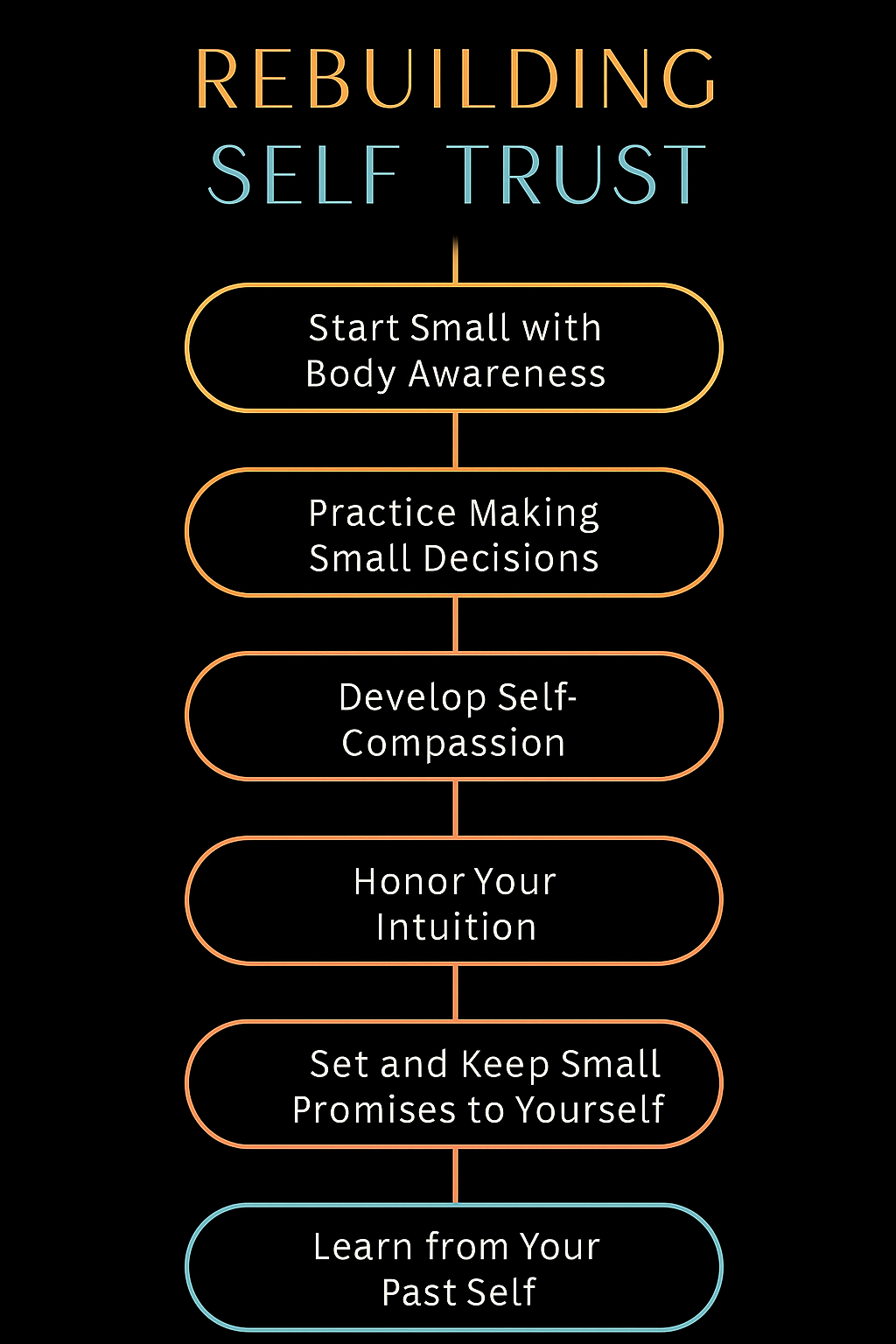
Practical Steps to Rebuild Self-Trust
Step 1: Start Small with Body Awareness
Your body holds wisdom that trauma might have taught you to ignore. Reconnecting with your body is the first step to rebuilding self-trust.
Daily Body Check-Ins:
- Set phone reminders 3 times a day
- Ask: "How does my body feel right now?"
- Notice: Hungry? Tired? Tense? Relaxed?
- Honor what you notice: Eat if hungry, rest if tired
The Body Scan Practice:
- Lie down or sit comfortably
- Start at your toes and work up
- Notice each part of your body
- Don't try to change anything, just notice
- Thank your body for carrying you through life
Tuning into Emotions:
- When you feel something, pause
- Ask: "What emotion is this?"
- Where do you feel it in your body?
- What might it be trying to tell you?
Step 2: Practice Making Small Decisions
Start rebuilding decision-making skills with low-stakes choices.
Daily Decision Practice:
- What to wear
- What to eat for lunch
- Which route to take home
- What music to listen to
- What time to go to bed
The Decision Process:
- Notice your first instinct
- Ask: "What feels right in my body?"
- Make the choice quickly
- Notice the result without judgment
- Celebrate that you made a decision
Decision Journal:
- Write down small decisions you made
- Note how they turned out
- Notice patterns in your good choices
- Build evidence that you CAN make good decisions
Step 3: Develop Self-Compassion
Self-trust grows in an environment of kindness, not criticism.
Changing Your Inner Voice:
Instead of: "I'm so stupid for feeling this way"
Try: "It makes sense that I feel this way given what I've been through"
Instead of: "I should be over this by now"
Try: "Healing takes time and I'm doing my best"
Instead of: "I always make bad choices"
Try: "I'm learning to make choices that are good for me"
The Best Friend Test:
- What would you say to a best friend going through this?
- Can you offer yourself the same kindness?
- Practice speaking to yourself like someone you love
Self-Compassion Break: When you're struggling:
- "This is a moment of suffering"
- "Suffering is part of life"
- "May I be kind to myself in this moment"
Step 4: Honor Your Intuition
Your gut feelings are valuable information, even if they don't always make logical sense.
Gut Feeling Practice:
- When meeting new people, notice your first impression
- Pay attention to how places make you feel
- Notice which activities energize vs. drain you
- Track when your intuition was right
The Pause Practice:
- Before making decisions, pause
- Take a deep breath
- Ask: "What feels right?"
- Honor the first answer that comes up
- You can always change your mind later
Intuition vs. Fear:
- Intuition feels calm and knowing
- Fear feels panicked and urgent
- Intuition gives specific information
- Fear gives vague warnings
- Practice distinguishing between the two
Step 5: Set and Keep Small Promises to Yourself
Self-trust grows when you prove to yourself that you can be counted on.
Daily Promise Practice:
- Start with tiny promises: "I'll drink one glass of water"
- Keep them no matter what
- Gradually make slightly bigger promises
- Celebrate when you keep your word to yourself
Weekly Self-Care Promises:
- "I'll take one 10-minute walk this week"
- "I'll call one friend"
- "I'll do something creative for 15 minutes"
- "I'll go to bed early one night"
The Self-Trust Bank Account:
- Every kept promise is a deposit
- Every broken promise is a withdrawal
- Start with promises you know you can keep
- Build up your "account balance" over time
Step 6: Learn from Your Past Self
Your past experiences contain wisdom about what works for you.
Success Inventory:
- Times you handled something difficult well
- Decisions that turned out good
- People you trusted who were trustworthy
- Moments you felt proud of yourself
- Challenges you overcame
Pattern Recognition:
- What situations bring out your best?
- What kind of people do you connect with?
- What activities make you feel like yourself?
- What warning signs have you learned to notice?
- What coping strategies actually help?
Wisdom Journal: Write down:
- "I learned that I can..."
- "I'm good at..."
- "I can trust myself to..."
- "My instincts were right when..."
Working with Your Inner Child
Often, the part of you that lost trust was very young. Healing involves reconnecting with and comforting that young part of yourself.
Understanding Your Inner Child
Your inner child is the part of you that holds:
- Your creativity and wonder
- Your ability to play and have fun
- Your authentic emotions
- Your sense of what's fair
- Your capacity for trust and love
Trauma might have forced this part of you to hide or grow up too fast.
Inner Child Healing Practices
Write Letters to Your Younger Self:
- "Dear 5-year-old me, I want you to know..."
- Tell them what you wish someone had said then
- Offer comfort and understanding
- Let them know they survived and you're proud of them
Photo Meditation:
- Find a childhood photo of yourself
- Look into that child's eyes
- Send them love and protection
- Promise to listen to their needs now
Inner Child Check-Ins:
- "What does the young part of me need right now?"
- Comfort? Play? Safety? Validation?
- Find age-appropriate ways to meet those needs

Building Supportive Relationships
Self-trust grows easier when you're surrounded by trustworthy people who believe in you.
Characteristics of Trust-Building Relationships
Safe People:
- Keep your secrets
- Don't judge your feelings
- Support your growth
- Respect your boundaries
- Are consistent in their care
Growth-Oriented People:
- Encourage your healing journey
- Celebrate your progress
- Give honest but kind feedback
- Challenge you in loving ways
- Model healthy self-trust
Red Flags in Relationships
Be cautious of people who:
- Tell you that you can't trust yourself
- Dismiss your feelings or experiences
- Try to make decisions for you
- Get angry when you set boundaries
- Make you feel worse about yourself
Building Your Support Network
Professional Support:
- Trauma-informed therapist
- Support groups
- Trusted medical providers
Personal Support:
- Family members who understand
- Friends who support your healing
- Mentors or guides
- Online communities for trauma survivors
Real Stories from Our Practice
Names and details changed to protect privacy
Lisa's Journey: Lisa came to therapy unable to make even simple decisions like what to order at restaurants. Through therapy, she learned that her critical mother had taught her to doubt herself. We started with tiny decisions and body awareness. After six months, she bought her first car by herself – something she never thought she could do. Now she trusts her ability to figure things out.
David's Experience: David grew up in chaos and learned to ignore his own needs to keep everyone else happy. In therapy, we worked on inner child healing and setting boundaries. He started honoring his need for quiet time and saying no to social events when he felt overwhelmed. As he began caring for himself, his confidence grew. Now he's in a healthy relationship and pursuing a career he loves.
Maria's Transformation: Maria lost trust in herself after an abusive relationship where her partner constantly told her she was "crazy" and "too sensitive." Through EMDR and somatic work, she reconnected with her body's wisdom. She learned to trust her gut feelings about people again. Now she's in a supportive relationship and has started her own business.
When Self-Trust Feels Scary
As you rebuild self-trust, you might feel scared. This is normal. Here's why it might feel frightening and what to do:
Why Self-Trust Can Feel Dangerous
- You might make mistakes (and that feels risky)
- Others might not like your choices
- You might disappoint people
- It means taking responsibility for your life
- Change feels uncertain
Gentle Reminders
- Making mistakes is how humans learn
- You can't control other people's reactions
- Disappointing others sometimes is part of healthy boundaries
- Taking responsibility is empowering, not burdensome
- Uncertainty is uncomfortable but not dangerous
Moving Through the Fear
Start Small: You don't have to trust yourself with huge decisions right away.
Get Support: Work with a therapist or trusted friend as you practice.
Remember Your Resilience: You've survived difficult things before.
Be Patient: Self-trust grows slowly and that's okay.

Professional Support for Rebuilding Self-Trust
Sometimes rebuilding self-trust requires professional help, especially when trauma was severe or happened early in life.
Therapy Approaches That Help
Internal Family Systems (IFS): Helps you reconnect with your authentic self and heal wounded parts.
EMDR: Processes traumatic memories that created self-doubt.
Somatic Experiencing: Helps you reconnect with your body's wisdom.
Cognitive Behavioral Therapy (CBT): Challenges negative thought patterns about yourself.
Trauma-Informed Therapy: Understands how trauma affects self-trust and provides a safe space for healing.
What to Look for in a Therapist
- Experience with trauma and self-trust issues
- Creates a safe, non-judgmental space
- Supports your autonomy and decision-making
- Helps you reconnect with your inner wisdom
- Believes in your ability to heal and grow
Signs of Growing Self-Trust
As you heal, you'll notice these positive changes:
Daily Life Changes
- Making decisions feels easier
- You notice and honor your feelings
- Setting boundaries feels natural
- You can comfort yourself when upset
- Asking for help feels okay
Relationship Changes
- You attract healthier people
- You speak up for yourself
- You trust your gut about people
- You don't lose yourself in relationships
- You can disagree without falling apart
Internal Changes
- Your inner voice becomes kinder
- You feel more confident
- You trust your ability to handle challenges
- You feel worthy of good things
- You enjoy your own company
Growth Milestones
- Taking risks that align with your values
- Pursuing goals that matter to you
- Standing up for what you believe in
- Creating the life you want
- Helping others on their healing journey
Your Self-Trust Is Worth Rebuilding
Rebuilding self-trust after trauma is one of the most important gifts you can give yourself. It's the foundation for everything else – healthy relationships, meaningful work, personal growth, and genuine happiness.
This journey takes time. Some days will feel easier than others. Be patient and gentle with yourself. Every small step matters.
You survived what happened to you. You have wisdom inside you. You are worthy of trust – especially your own.
Remember These Truths
- Your feelings are valid and important
- You have good instincts, even if they've been buried
- You can learn to make decisions that are right for you
- You deserve love and respect, including from yourself
- Your healing matters and makes a difference
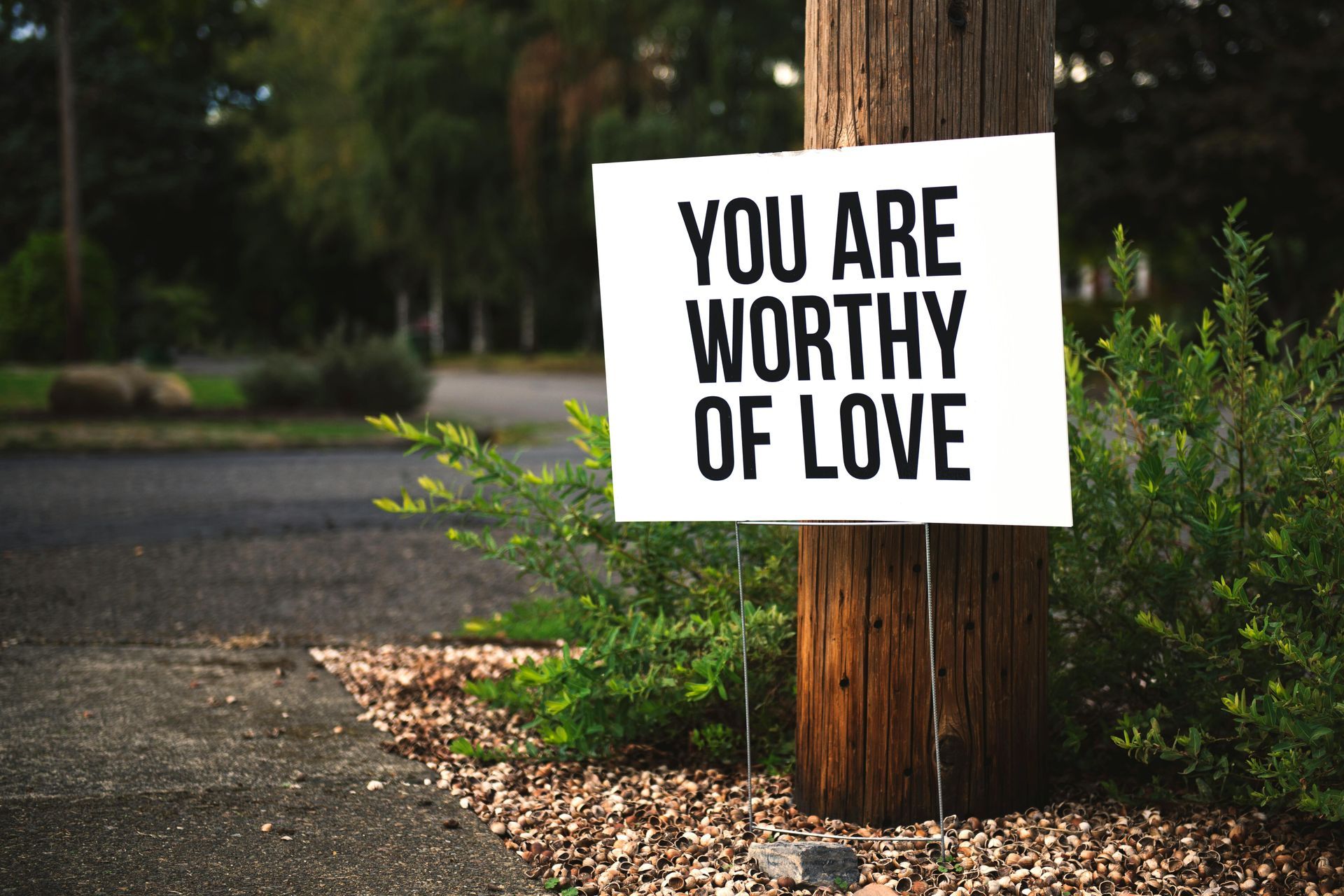
Take the Next Step
Whether you're just beginning to recognize that you've lost self-trust or you're already on the journey to rebuild it, know that support is available.
You don't have to figure this out alone. Professional help can make the journey faster and easier.
Ready to start rebuilding self-trust?
Schedule a free consultation with our trauma specialists:
- Phone: (254) 826-9450
- Email: info@liveconsciouslypllc.com
- Website: www.liveconsciouslypllc.com
We understand the journey from survival to growth, and we're here to support you every step of the way.

About the Author:
Alexandrea Long, LCSW-S, is the founder and clinical supervisor at Live Consciously, PLLC. As a Licensed Clinical Social Worker-Supervisor, Alexandrea specializes in trauma-informed care and has extensive experience helping clients heal from complex trauma, PTSD, and childhood wounds. She is trained in evidence-based modalities including Somatic Experiencing, EMDR, Internal Family Systems (IFS), and Acceptance and Commitment Therapy (ACT). Alexandrea is passionate about integrating mind-body healing approaches and helping clients move beyond survival mode into deep, lasting transformation. She believes in addressing trauma at the root level through nervous system regulation and holistic healing practices.
Crisis Resources:
- National Suicide Prevention Lifeline: 988
- Crisis Text Line: Text HOME to 741741
- SAMHSA National Helpline: 1-800-662-4357
- National Domestic Violence Hotline: 1-800-799-7233
References:
- Schwartz, R. C. (2021). No Bad Parts: Healing trauma and restoring wholeness with the Internal Family Systems model. Sounds True.
- Van der Kolk, B. (2014). The Body Keeps the Score: Brain, mind, and body in the healing of trauma. Viking Penguin.
- Brown, B. (2010). The Gifts of Imperfection: Let go of who you think you're supposed to be and embrace who you are. Hazelden Publishing.
- Neff, K. (2011). Self-Compassion: The proven power of being kind to yourself. William Morrow.
This article is for informational purposes only and is not a substitute for professional medical advice, diagnosis, or treatment. Always seek the advice of your physician, mental health professional, or other qualified health provider with any questions you may have regarding a medical condition.
